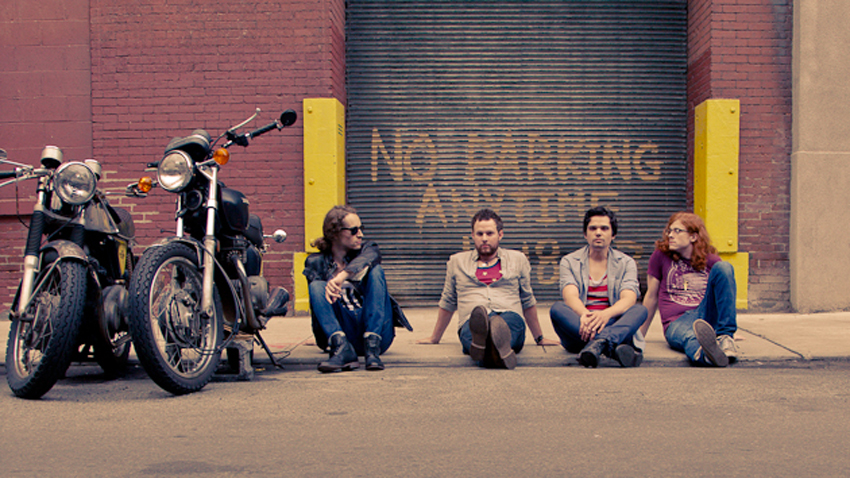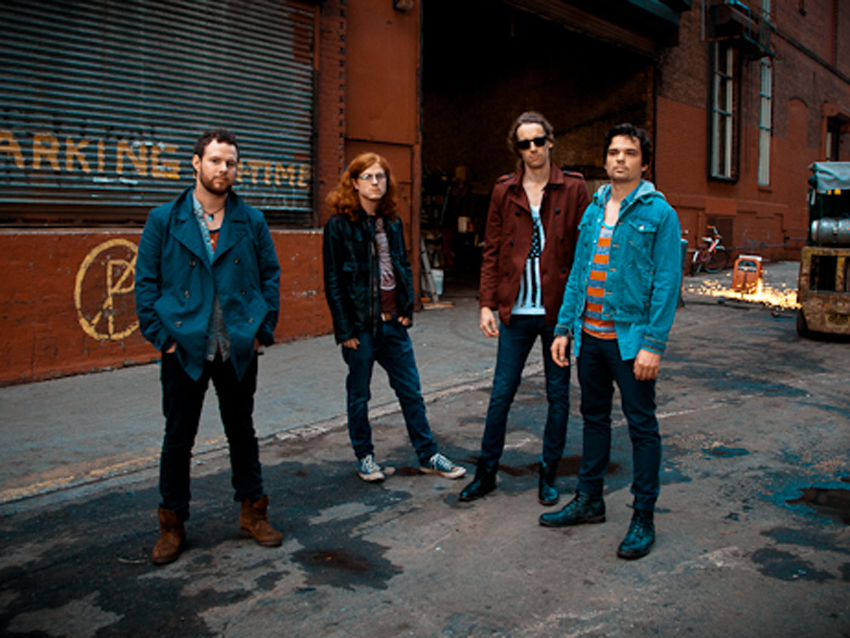
Want all the hottest music and gear news, reviews, deals, features and more, direct to your inbox? Sign up here.
You are now subscribed
Your newsletter sign-up was successful
"You have to be patient in this business," says Andy Brewer, lead singer and guitarist with the Oklahoma-based band Taddy Porter. "That's pretty difficult because everything is supposed to happen now. You don't want to sell yourself as something you're not, and I think we did that on the first record. As some time has gone by, we feel that we're putting our true selves out there now. We were humbled a bit, but we're better for it."
Taddy Porter (Andrew Brewer, vocals and guitar; Joe Selby, lead guitar; Doug Jones on drums and his brother Kevin on bass) made a decent-sized splash with their self-titled 2010 debut, a fulsome blend of Free/Bad Company bues-rock riffage topped off by Brewer's expansive Joe Cocker meets Robert Plant-style vocals. The new album, Stay Golden (the title is a reference to SE Hinton's beloved 1967 novel The Outsiders), co-produced by Dave Cobb and Mark Neill, is a giant step forward - it's scrupulously crafted yet loose - and it's one of the most difficult kinds of records for a band to pull off, because it comes at you bursting with so many nuanced meanings and personal revelations.
Brewer sat down to talk with MusicRadar about the new album, what it's like to launch a band out of Stillwater, Oklahoma, whether recent events gave him second thoughts about naming a song The Gun and how he and Selby work out their guitar sounds.
Talk to me about the music scene in Oklahoma. Would you say it's pretty vibrant?
"It's good, yeah. We met each other in Stillwater, which is a college town. You're more apt to find some musically inclined people in a place like that. When we started piecing the band together and playing shows in Stillwater, there weren't a lot of bands around. All-American Rejects is from Stillwater, and they made a pretty good name for themselves.
"And there's a group called Other Lives. They're sort of a genre unto themselves - easy listening/ambient, but they're heavy at the same time. The best thing about Stillwater is, there really aren't competing genres. When you think of Oklahoma, you think 'red dirt' country music or just country music in general; you don't think of a band like us."
How hard or easy was it for you guys to become big fish in a small pond?
Want all the hottest music and gear news, reviews, deals, features and more, direct to your inbox? Sign up here.
"We were a band for about four months, and of course, we thought we were the greatest band in the world. But we were just being naïve and what not. But we wanted to share our music with the world, and so we entered a battle of the bands in Oklahoma City, and we won. That led to us meeting our managers and our record label.
"We were hungry for it. After a rehearsal, we would talk about our aspirations, which were quite big. We didn't just want to play a show every once in a while - we wanted to do national tours and make records and all of that. So if we became a big fish in Oklahoma, it was due to us wanting to push our name out there and be in front of as many people as possible."
Did the band ever talk about relocating to either LA or New York City?
"Oh, yeah, all the time - and other towns, too. We went on a short tour and played Nashville, and we were all like, 'We've got to move to Nashville.' Then we played Austin and we wanted to move there, too. We went to Los Angeles at the very beginning of the band, and it just seemed so gigantic. In Oklahoma, we were able to get ourselves known pretty quickly; to do the same thing in LA, where you just feel so little, we knew that would take some time."
You recorded the new album in Nashville - not a bad music town.
[Laughs] "No, it's not bad. Nashville is awesome. You think of Nashville as being purely country, but it's evolved into a real music mecca. We were fortunate enough to find a place to stay in a cabin on a hill a - sort of like where I am now - and let the music come to us."
How do you and Joe contrast your guitar styles and sounds? Do you try to go for different models in guitars and amps?
"Definitely. We try to answer each other in both parts and sounds. Joe plays a Les Paul, which has more grit to it. To go up against that, I wanted something with a glassier and prettier tone, something with less grit, and so I chose a Gretsch hollow body, an Electromatic. I changed the pickups out of it so that it has the same ones that are in White Falcons. It's got a real chime to it.
"I love hollow bodies. I played a Sheridan when we started the band, but I moved away from it. I thought I knew what I wanted it to sound like, but that kind of changed, and the Gretsch ended up sounding better. But to go up against a Les Paul, you need something way different."
You and Joe get some great, naturally dirty guitar sounds on the song Changes. That's real amp buzz - it doesn't sound like a dialed-in digital sound.
"That's exactly right. We played through a little amp with an eight-inch speaker and just cranked it up. The guys in the control room made it sound huge on top of everything. You don't need a giant amp to get a great sound. Actually, we just got a little Supro, and when we were using it in rehearsal I said, 'Hey, that sounds familiar… '"
"Jimmy Page! He used those little Supros."
Fever has a real Motown/Nowhere To Run-type vibe.
"Oh, for sure. We wanted to try something in that vein, do a call-and-response kind of thing. I grew up listening to my big sister sing; she was the one who really inspired me to pursue music. She sang Motown stuff and things by Etta James and Mavis Jackson, and she was listening to newer singers, too, like Lauryn Hill and India Arie. I soaked all of that up, just the soulfulness. I heard singers in church, too, and they could make your hair stand on end."

"We thought we were the greatest band in the world," says Brewer (third from left) about Taddy Porter's early days. "But we were just being naïve." Anna Webber
Talk to me about the song The Gun (Part 1). There's no second part to the song - what's the story there?
"We wanted to write two versions of the same song; the second one just continues on with the same story. It's about a hit man who is hired to kill another gentleman who has stolen the heart of this guy's girl. The thing is, the guy who is supposed to die has been falsely accused, so the hit man ties him up and gives him a chance to explain himself.
"It turns out that the reason why the hit man is so interested in what's going on is because he's really a woman. He's a hit woman - a 'hittress.' [Laughs] The hit woman has actually been through this before, and that'll be explained in the second part, which will happen at some point."
Given the climate we're in these days, with gun control such a hot issue, was there ever any thought to not including the song on the album?
"I did think about that. Originally, the song was going to be called Let It Begin, but we wanted it to be The Gun because that's the way we described it. Yes, I do feel that what has happened as of late, and what's happening with gun control laws being thrown around… See, to an artist, the gun can mean so many different things.
"As we write and finish the second part of the song, it actually gives me an incentive to paint the gun as something more than just a weapon. But when we wrote the song and made the album, none of this stuff had happened yet. We'll see how everything goes. Hopefully, the song isn't misconstrued."
The band is still fairly new, yet you're a lot further along in your career than most groups. What advice do you have for musicians out there trying to make it?
"If somebody could have given me advice when we first started, it would be to have somebody around you who wants it as bad as you - an aspiring manager or a friend who could take on some tour responsibilities. If you can have a relationship with somebody and be able to bounce ideas off of him, 'cause it's so easy for a band to get wrapped up in what they think is right or wrong. Having people around who can shift through situations is really helpful. That's what I wish I knew when we were just starting out."
Joe is a freelance journalist who has, over the past few decades, interviewed hundreds of guitarists for Guitar World, Guitar Player, MusicRadar and Classic Rock. He is also a former editor of Guitar World, contributing writer for Guitar Aficionado and VP of A&R for Island Records. He’s an enthusiastic guitarist, but he’s nowhere near the likes of the people he interviews. Surprisingly, his skills are more suited to the drums. If you need a drummer for your Beatles tribute band, look him up.
